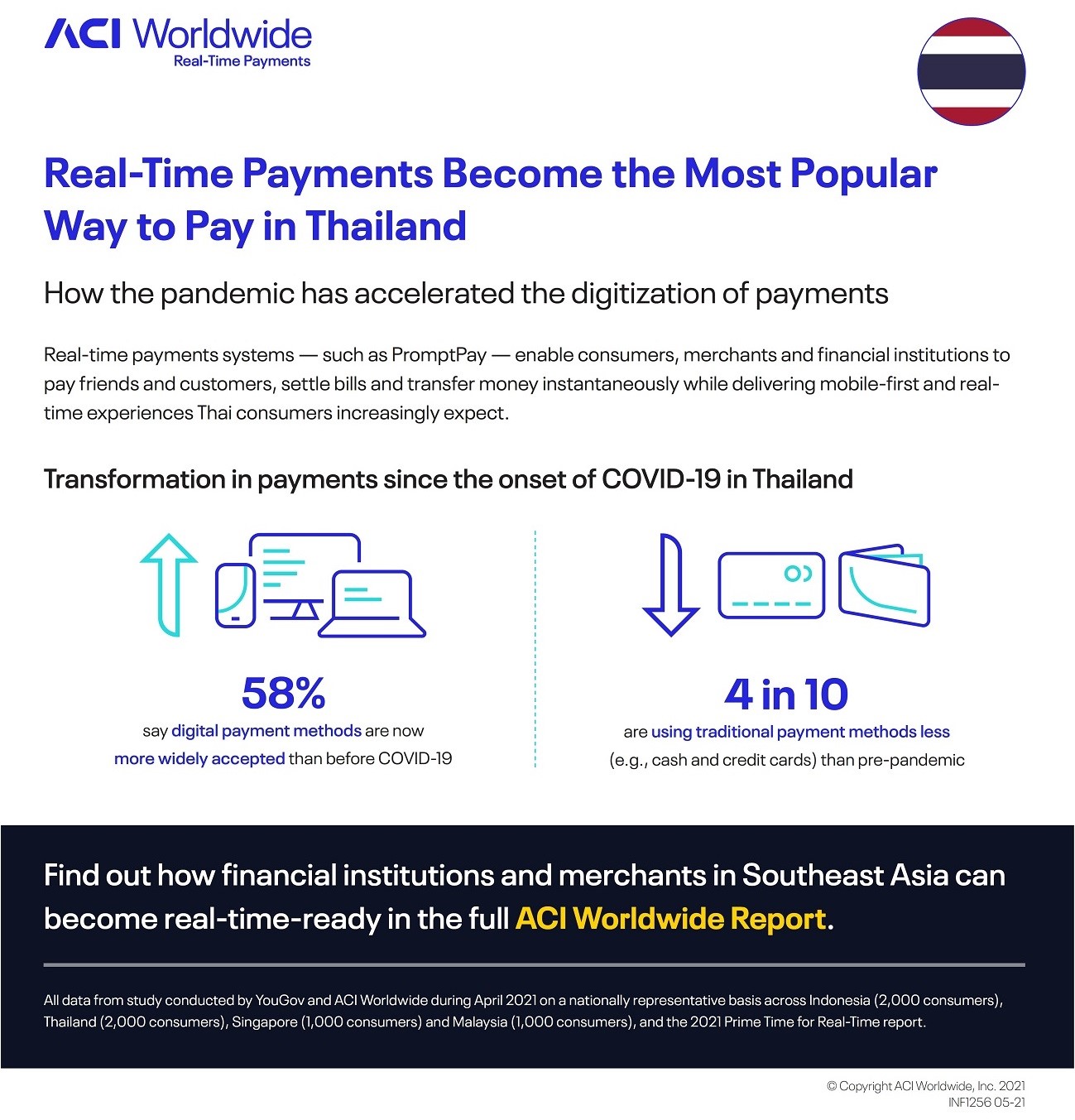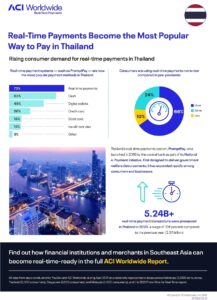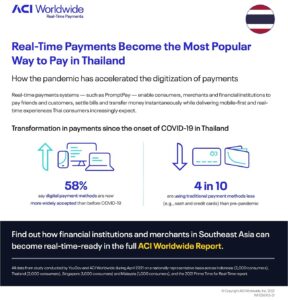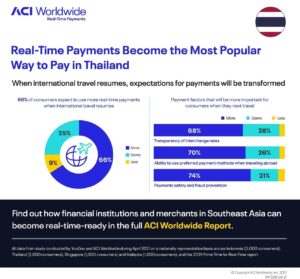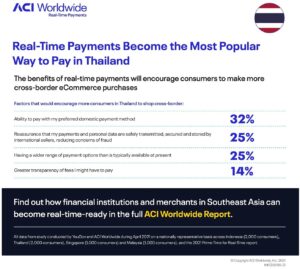- ในปี 2564 ผู้บริโภคไทยเกือบสามในสี่ (72%) เลือกใช้วิธีการชำระเงินแบบเรียลไทม์ อาทิพร้อมเพย์ เป็นช่องทางหลักในการชำระเงิน ซึ่งเป็นอัตราที่สูงกว่าการใช้เงินสด (63%) และดิจิทัลวอลเล็ท (49%)
- นับตั้งแต่เกิดการระบาดของโควิด-19 ผู้บริโภคไทยสี่ในสิบคน (40%) ใช้วิธีชำระเงินแบบเดิม เช่น เงินสด บัตรเครดิต และบัตรเดบิต น้อยลง
- การที่ผู้บริโภคมีความต้องการรูปแบบการชำระเงินแบบเรียลไทม์มากขึ้น บ่งชี้ถึงความจำเป็นเร่งด่วนในการปรับปรุงระบบชำระเงินให้ทันสมัยทั่วภูมิภาคเอเชียตะวันออกเฉียงใต้ รวมถึงการสร้างระบบนิเวศการชำระเงินแบบเรียลไทม์ข้ามพรมแดนในระดับภูมิภาค
กรุงเทพฯ – 7 กรกฎาคม 2564 – ผลสำรวจของเอซีไอ เวิลด์ไวด์ (ACI Worldwide) (NASDAQ: ACIW) และยูกอฟ (YouGov) ระบุว่าผู้บริโภคไทยในปัจจุบันนิยมชำระเงินแบบเรียลไทม์ (Real-Time Payment) มากกว่าการชำระด้วยเงินสดและโมบายล์วอลเล็ท โดยในปี 2564 ผู้บริโภคไทยเกือบสามในสี่ (72%) เลือกใช้วิธีการชำระเงินแบบเรียลไทม์ เช่น พร้อมเพย์ (PromptPay) เป็นช่องทางหลักในการชำระเงิน ซึ่งเป็นอัตราที่สูงกว่าการใช้เงินสด (63%) และดิจิทัลวอลเล็ทที่ต้องโอนเงินเข้าบัญชีหรือบัตรเติมเงิน (49%)
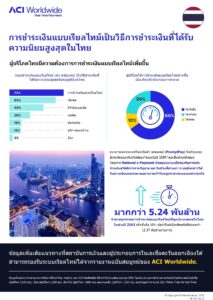
ความจำเป็นที่ต้องเปลี่ยนรูปแบบการชำระเงินเนื่องจากการระบาดของโควิด-19 เป็นปัจจัยเร่งให้เกิดการเปลี่ยนไปใช้วิธีการชำระเงินแบบเรียลไทม์อย่างรวดเร็ว และนับตั้งแต่เกิดการระบาดของโควิด-19 ผู้บริโภคไทยสี่ในสิบคน (40%) ใช้วิธีชำระเงินแบบเดิม เช่น เงินสด บัตรเครดิต และบัตรเดบิต น้อยลง และส่งผลให้สองในสามของผู้บริโภค (66%) ใช้วิธีการชำระเงินแบบเรียลไทม์มากกว่าเดิม เมื่อเทียบกับช่วงก่อนการระบาด
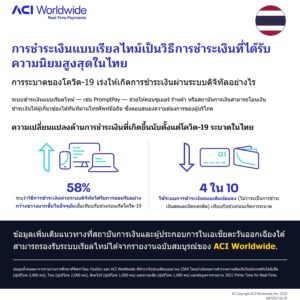
การเปลี่ยนแปลงทางเทคโนโลยีที่เกิดขึ้นอย่างรวดเร็ว ส่งผลให้ผู้บริโภคในปัจจุบันคาดหวังว่าจะได้รับประสบการณ์แบบเรียลไทม์ผ่านอุปกรณ์โมบายเป็นหลัก แต่การชำระเงินมักทำได้อย่างล่าช้า การพัฒนาระบบชำระเงินแบบเรียลไทม์ช่วยให้ผู้บริโภค ผู้ประกอบการ และสถาบันการเงินสามารถชำระเงิน จ่ายบิล และโอนเงินได้ทันที แม้ว่าเงินสดถือเป็นวิธีการชำระเงินแบบ “ทันที” มาโดยตลอด แต่ระบบชำระเงินแบบเรียลไทม์ที่เกิดขึ้นนี้เป็นแนวทางการใช้เงินสดชำระเงินเข้าสู่ยุคดิจิทัล ย่นระยะเวลาชำระบัญชีที่รวดเร็วขึ้น ทั้งยังมีการแจ้งเตือนและการรายงานข้อมูลอย่างครบถ้วน
นายเลสลี่ ชู กรรมการผู้จัดการประจำภูมิภาคเอเชียของเอซีไอ เวิลด์ไวด์ กล่าวว่า “ความเปลี่ยนแปลงนี้สร้างความท้าทายให้กับสถาบันการเงิน ธนาคารและผู้ประกอบการที่ต้องสนองความคาดหวังและต้องการของผู้บริโภค องค์กรเหล่านี้จำเป็นที่จะต้องเร่งปรับปรุงระบบและการดำเนินงานให้ทันสมัย แม้ต้องเผชิญกับความท้าทายที่มีสาเหตุจากโควิด-19 ก็ตาม แต่หากมองอีกมุมหนึ่ง องค์กรจะสามารถขับเคลื่อนการเติบโตของธุรกิจด้วยการเข้าร่วมในระบบนิเวศด้านการชำระเงินแบบเรียลไทม์ที่เพิ่งเกิดขึ้นในภูมิภาคนี้ ซึ่งจะช่วยเพิ่มขีดความสามารถในการคิดค้นสิ่งใหม่และปฏิรูปองค์กร ควบคู่ไปกับการลดค่าจ่ายด้านโครงสร้างพื้นฐานและการดำเนินงาน”
รายงานของเอซีไอ เวิลด์ไวด์ และยูกอฟ ยังระบุว่า ผู้บริโภคไทยคาดหวังว่าจะสามารถใช้ประโยชน์จากการชำระเงินแบบเรียลไทม์ในต่างประเทศได้เหมือนกับที่ใช้อยู่ในประเทศ เพื่อรองรับการสั่งซื้อสินค้าจากประเทศอื่น ๆ รวมถึงการเดินทางระหว่างประเทศเมื่อสามารถเดินทางได้ ซึ่งผู้บริโภคคาดหวังความโปร่งใส ความปลอดภัย และความสะดวกในการชำระเงินว่าจะอยู่ในระดับสูงกว่าประสบการณ์ที่เคยได้รับจากการเดินทางก่อนเกิดโควิด-19
- สองในสาม (66%) ของผู้บริโภคไทยที่เคยเดินทางไปต่างประเทศคาดว่าตนเองจะใช้บริการชำระเงินแบบเรียลไทม์เพิ่มขึ้นในการเดินทางครั้งต่อไป
- 70 เปอร์เซ็นต์ระบุว่าความสามารถในการใช้ช่องทางการชำระเงินตามที่ต้องการขณะเดินทางไปต่างประเทศจะกลายเป็นเรื่องที่มีความสำคัญมากขึ้น และด้วยเหตุนี้ ผู้บริโภคกว่าหนึ่งในสาม (35%) คาดว่าในการเดินทางครั้งถัดไปจะลดการใช้วิธีการชำระเงินแบบเดิม เช่น เงินสด
- สามในสี่ (74%) ระบุว่าความปลอดภัยในการชำระเงินและการป้องกันการฉ้อโกงมีความสำคัญเพิ่มขึ้น ขณะที่สองในสาม (68%) กล่าวว่าความโปร่งใสของอัตราแลกเปลี่ยนนับว่ามีความสำคัญมากขึ้นกว่าในอดีต
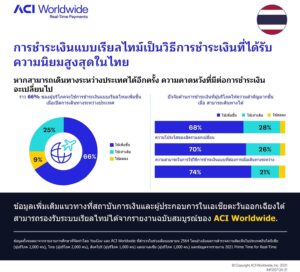
ผู้บริโภคชาวไทยที่ซื้อสินค้าอีคอมเมิร์ซจากต่างประเทศมีจำนวนเพิ่มขึ้นในช่วงปีที่ผ่านมา ขณะเดียวกันผู้บริโภคก็ต้องการมาตรการรับประกันเพิ่มเติมเกี่ยวกับการชำระเงิน เพื่อให้เกิดความเชื่อมั่นในการจับจ่ายซื้อสินค้าเพิ่มขึ้นในอนาคต:
- ผู้บริโภคมากกว่าหนึ่งในสี่ (27%) ซื้อสินค้าจากผู้ประกอบการในประเทศอื่น ๆ ในเอเชียตะวันออกเฉียงใต้เพิ่มขึ้น นับตั้งแต่เกิดการแพร่ระบาด ส่วนผู้บริโภคที่ซื้อสินค้าเพิ่มขึ้นจากร้านค้านอกเอเชียตะวันออกเฉียงใต้ก็อยู่มีจำนวนใกล้เคียงกัน (26%)
- ปัจจัยสำคัญที่สุดที่จะช่วยกระตุ้นให้ผู้บริโภคซื้อสินค้าและบริการอย่างสม่ำเสมอมากขึ้นจากผู้ขายในต่างประเทศมีดังต่อไปนี้
- ความสามารถในการจ่ายเงินผ่านช่องทางชำระเงินในประเทศตามที่ต้องการ (32%)
- การนำเสนอทางเลือกในการชำระเงินที่หลากหลายกว่าปัจจุบัน (25%)
- ความมั่นใจว่าข้อมูลการชำระเงินและข้อมูลส่วนตัวจะได้รับความคุ้มครอง โดยมีการรับ-ส่งและจัดเก็บข้อมูลอย่างปลอดภัยโดยผู้ประกอบการในต่างประเทศ (25%)
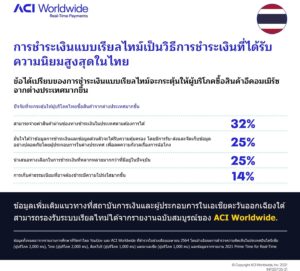
นายเลสลี่ ชู กล่าวเสริมว่า “การให้ความสำคัญกับการปรับปรุงระบบชำระเงินให้ทันสมัยถือเป็นเรื่องสำคัญอย่างยิ่งของสถาบันการเงินที่ต้องการช่วงชิงความเป็นผู้นำท่ามกลางกระแสความเปลี่ยนแปลงครั้งใหญ่ที่สุดในด้านระบบชำระเงินในภูมิภาคนี้ รวมถึงการสร้างระบบนิเวศการชำระเงินแบบเรียลไทม์ระหว่างประเทศ ขณะที่ประเทศที่พัฒนาแล้วถูกผูกมัดด้วยระบบชำระเงินรุ่นเก่าซึ่งเป็นอุปสรรคต่อการสร้างสรรค์นวัตกรรม แต่ประเทศในเอเชียตะวันออกเฉียงใต้ไม่มีอุปสรรคในเรื่องนี้ ดังนั้นจึงสามารถใช้ประโยชน์จากโครงสร้างพื้นฐานที่แข็งแกร่งกับระบบชำระเงินส่วนกลางภายในประเทศ เพื่อรองรับการชำระเงินแบบเรียลไทม์ระหว่างประเทศ ซึ่งนับเป็นปัจจัยเร่งให้เกิดการขยายตัวด้านธุรกิจและการค้าในช่วงหลายปีนับจากนี้”
ข้อมูลเพิ่มเติมเกี่ยวกับความนิยมที่ผู้บริโภคมีต่อระบบการชำระเงินแบบเรียลไทม์ และแนวทางที่จะทำให้สถาบันการเงินและผู้ประกอบการในเอเชียตะวันออกเฉียงใต้พร้อมใช้ระบบเรียลไทม์ ได้จากรายงานฉบับเต็ม: Real-Time Goes Mainstream
ระเบียบวิธีที่ใช้ในการศึกษา
รายงานการศึกษาของ YouGov อ้างอิงผลการสำรวจความคิดเห็นที่ดำเนินการในช่วงเดือนเมษายน 2564 ในประเทศอินโดนีเซีย (ผู้บริโภค 2,000 คน), ไทย (ผู้บริโภค 2,000 คน), สิงคโปร์ (ผู้บริโภค 1,000 คน) และมาเลเซีย (ผู้บริโภค 1,000 คน)
